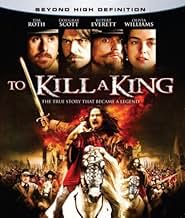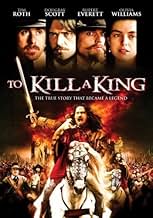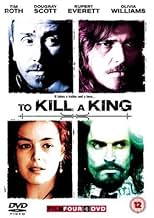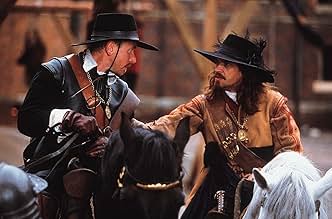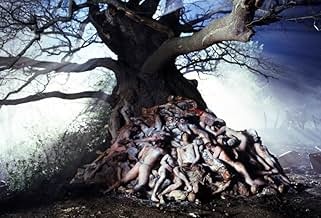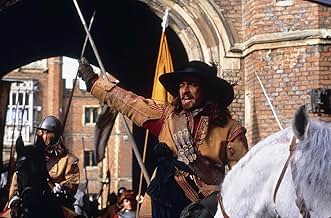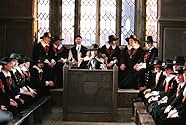AVALIAÇÃO DA IMDb
6,2/10
3,5 mil
SUA AVALIAÇÃO
Um relato da relação entre o General Fairfax e Oliver Cromwell, enquanto eles tentam lidar com as consequências da deposição do rei Carlos I.Um relato da relação entre o General Fairfax e Oliver Cromwell, enquanto eles tentam lidar com as consequências da deposição do rei Carlos I.Um relato da relação entre o General Fairfax e Oliver Cromwell, enquanto eles tentam lidar com as consequências da deposição do rei Carlos I.
- Direção
- Roteirista
- Artistas
- Indicado para 1 prêmio BAFTA
- 3 indicações no total
Avaliações em destaque
Although it presents endless possibilities for costume, action, and worthy 'English' performances, the English Civil War is not a fertile inspiration for films. It has, of course, featured as wallpaper in the 'bodice ripping' genre -'The Scarlet Blade' and 'The Moonraker'come to mind. It also provided the context for the excellent 'Witchfinder General', and the little known and undervalued 'Winstanley'. But there is only one film that comes anywhere near depicting the great and complex panoramic sweep of this period - 'Cromwell'.
I have to tell you that there still is.....for 'To Kill a King' corresponds to that animal most associated with the Puritans across the Atlantic. In short, it's a turkey. Oh, it could have amounted to something, for the ingredients are there if you look hard enough. But it would have helped if the scriptwriters and the director took time out to...well...read a history book.
Now, at this very moment, no doubt, dozens of people will immediately jump out of the woodwork and say 'but it's meant to be entertainment, not a historical documentary!' True enough, and as the credits say at the end, certain events have been altered for dramatic effect. I've no argument with that. If it had kept some sense of proportion, as in 'Michael Collins' (or 'Cromwell' for that matter) I would rest easy. But this film throws out the baby with the bathwater.
The whole of the civil war is reduced to a backdrop for an angst-ridden relationship. There is absolutely no-one else (apart from a pantomine villain) on the whole parliamentarian side, save Cromwell and Fairfax. It's like a seventeenth century version of Cameron's 'Titanic' without the special effects. The mutinous army? The Leveller 'agitators'? The Independent leaders? Not a sign of them! No, Cromwell and Fairfax call all the shots, have the king arrrested etc. etc.
Ah, you say, but that clears the ground for some fine characterisation and acting. Well....not really. You see, the characters of Cromwell and Charles I are absolutely fascinating, and we know so much about them from contemporary sources. In fact, much more interesting than what we get on the screen. The man who desperately wanted a constitutional settlement with the king; who was tolerant of divergent views; and ended up using the army to curb the tyrannical tendencies of the Presbyterian faction of Parliament (an amazing irony, if ever there was one), is depicted as a kind of seventeenth century Trotskyite, the kind of person trying to sell you 'Socialist Worker', complete with the glazed eyes. The man who was devoted to his family, liked music, and loved practical jokes, is played as a humourlous monomaniac. In short, Tim Roth's Cromwell verges on charicature.(At one point, I thought that he had turned into Clint Eastwood's 'Man With No Name', but it could have been the hat.)
Dougray Scott, as Fairfax, is the best thing in it - at least he seems half way believable (though not as a Yorkshireman). Charles I is something else. The real one was refined, courteous, and chaste. Presumably, Rupert Everett must have realised this, as it is evident that he put some time in watching the superb performance by Alec Guiness. (You can almost hear him thinking...'oh..it's about time that I stuttered again!') However this Charles is without charm - slapping his guard, sneering, and flirting with Fairfax's wife.... And then there is Denzil Holles. James Bolan does not appear that enthusiatic - in fact, he almost telephones his lines in.
On a positive note, the film has some moments that are unintentially hilarious. Charles accompanies Mrs. Fairfax on the virginals(?) as she gives a rendering of 'It was a Lover and His Lass'. Cromwell bursts in and starts heaving the furniture around just as they get to the 'hey nonny noes'. We later cut to the Tower of London for some curiously linked vignettes. After a torture session, one of Cromwell's guards hacks off a head for his master's delectation. Charles's Death Warrant is being signed before the trial by this evil lot. All this is done to the accompaniment of a choir of black gowned puritans chanting....no, not a jingle for Quaker Oats, but some strange dirge that is meant to symbolise ascetic intolerance. Yes, folks, nearly all the parliamentarians are sponsored by the breakfast food. Not only is this costume inaccurate, but it's slipshod and boring. After a reconciliation invoving some male bonding, Cromwell suggests Fairfax join him in invading Scotland in the same tone that a mate might propose calling for a curry after the pub shuts.
What else? Did you know that Cromwell pistolled street vendors of Charles I memorabilia? That he wasn't really a General until the war was over?
I'm not really sure who, exactly,this film is aimed at. It won't have the resonance of hokum like 'Braveheart' or 'The Patriot', for the text exposition at the start curves across the screen like battlesmoke. It doesn't have much in the way of action or sex. There aren't any fine dramatic performances. So what on earth were they trying to do?
I have to tell you that there still is.....for 'To Kill a King' corresponds to that animal most associated with the Puritans across the Atlantic. In short, it's a turkey. Oh, it could have amounted to something, for the ingredients are there if you look hard enough. But it would have helped if the scriptwriters and the director took time out to...well...read a history book.
Now, at this very moment, no doubt, dozens of people will immediately jump out of the woodwork and say 'but it's meant to be entertainment, not a historical documentary!' True enough, and as the credits say at the end, certain events have been altered for dramatic effect. I've no argument with that. If it had kept some sense of proportion, as in 'Michael Collins' (or 'Cromwell' for that matter) I would rest easy. But this film throws out the baby with the bathwater.
The whole of the civil war is reduced to a backdrop for an angst-ridden relationship. There is absolutely no-one else (apart from a pantomine villain) on the whole parliamentarian side, save Cromwell and Fairfax. It's like a seventeenth century version of Cameron's 'Titanic' without the special effects. The mutinous army? The Leveller 'agitators'? The Independent leaders? Not a sign of them! No, Cromwell and Fairfax call all the shots, have the king arrrested etc. etc.
Ah, you say, but that clears the ground for some fine characterisation and acting. Well....not really. You see, the characters of Cromwell and Charles I are absolutely fascinating, and we know so much about them from contemporary sources. In fact, much more interesting than what we get on the screen. The man who desperately wanted a constitutional settlement with the king; who was tolerant of divergent views; and ended up using the army to curb the tyrannical tendencies of the Presbyterian faction of Parliament (an amazing irony, if ever there was one), is depicted as a kind of seventeenth century Trotskyite, the kind of person trying to sell you 'Socialist Worker', complete with the glazed eyes. The man who was devoted to his family, liked music, and loved practical jokes, is played as a humourlous monomaniac. In short, Tim Roth's Cromwell verges on charicature.(At one point, I thought that he had turned into Clint Eastwood's 'Man With No Name', but it could have been the hat.)
Dougray Scott, as Fairfax, is the best thing in it - at least he seems half way believable (though not as a Yorkshireman). Charles I is something else. The real one was refined, courteous, and chaste. Presumably, Rupert Everett must have realised this, as it is evident that he put some time in watching the superb performance by Alec Guiness. (You can almost hear him thinking...'oh..it's about time that I stuttered again!') However this Charles is without charm - slapping his guard, sneering, and flirting with Fairfax's wife.... And then there is Denzil Holles. James Bolan does not appear that enthusiatic - in fact, he almost telephones his lines in.
On a positive note, the film has some moments that are unintentially hilarious. Charles accompanies Mrs. Fairfax on the virginals(?) as she gives a rendering of 'It was a Lover and His Lass'. Cromwell bursts in and starts heaving the furniture around just as they get to the 'hey nonny noes'. We later cut to the Tower of London for some curiously linked vignettes. After a torture session, one of Cromwell's guards hacks off a head for his master's delectation. Charles's Death Warrant is being signed before the trial by this evil lot. All this is done to the accompaniment of a choir of black gowned puritans chanting....no, not a jingle for Quaker Oats, but some strange dirge that is meant to symbolise ascetic intolerance. Yes, folks, nearly all the parliamentarians are sponsored by the breakfast food. Not only is this costume inaccurate, but it's slipshod and boring. After a reconciliation invoving some male bonding, Cromwell suggests Fairfax join him in invading Scotland in the same tone that a mate might propose calling for a curry after the pub shuts.
What else? Did you know that Cromwell pistolled street vendors of Charles I memorabilia? That he wasn't really a General until the war was over?
I'm not really sure who, exactly,this film is aimed at. It won't have the resonance of hokum like 'Braveheart' or 'The Patriot', for the text exposition at the start curves across the screen like battlesmoke. It doesn't have much in the way of action or sex. There aren't any fine dramatic performances. So what on earth were they trying to do?
In 1645, after the revolutionary movement of the puritans against the King of England Charles I of Stuart (Rupert Everett), with the leadership of the best friends General Oliver Cromwell (Tim Roth) and General Thomas Fairfax (Dougray Scott), the king is judged and condemned to death by decapitation. General Oliver Cromwell wishes to implement the republic in England, but his monarchist friend Fairfax does not agree, and they break their friendship. Cromwell becomes a dictator, with the title of Lord Protector of the Commonwealth, until 1658, when he is very sick and dies. When I was a student, I had classes about this period of England history, but unfortunately not enough to make any judgement of the historical accuracy of this movie. As far as I remember, the period of the dictatorship of Cromwell was very violent, and it was omitted in the story. As a film, it is a beautiful story of the friendship and relationship of two leaders with different political objectives. The cast and direction are excellent, and the reconstitution of the period is wonderful. I have appreciated and recommend this movie without analyzing the accuracy of the events. If the viewer knows this period of history well, he will have the opportunity to verify its accuracy, otherwise he will a chance to enjoy a good movie. My vote is seven.
Title (Brazil): 'Morte ao Rei' ('To Kill a King')
Title (Brazil): 'Morte ao Rei' ('To Kill a King')
STAR RATING:*****Unmissable****Very Good***Okay **You Could Go Out For A Meal Instead*Avoid At All Costs
As a kid,I used to love learning all about the Tudors and Stewarts,especially about monarchs such as Henry the Eighth (sorry,I'm terrible at my Roman numerals),Edward the First (the youngest ever monarch) and Charles the first who was beheaded.So when I saw a film trailer promoting a new film about Charles and his conflict with Oliver Cromwell,who became head of the Roundheads,Charles's greatest adversaries,I felt inclined to go and see it as soon as possible.
The results were admirable,though not great.It boasts a fine central cast,in the shape of Tim Roth as Cromwell,Dougray Scott as his aide Thomas Fairfax,James Bolam as roguish parliamentary speaker Holles and Rupert Everitt as the ill-fated king himself.They all play their parts with dash and spirit,which can only be a good thing.And there's some fine photography and lavish costume design to add to the recommendations.
On the down side however,Mike Barker's direction becomes a little meandering and laboured and there are some fairly huge historical inaccuracies in the telling of the tale.
Still,everyone involved looks like they're enjoying starring in it,as indeed any 'actor' probably would,as this sort of period piece is how many such exhibitionists learn the art of fine drama.Just get yourself in the right mood,mosey on out,and I'm sure you might enjoy watching them perform it just as much.Or almost.***
As a kid,I used to love learning all about the Tudors and Stewarts,especially about monarchs such as Henry the Eighth (sorry,I'm terrible at my Roman numerals),Edward the First (the youngest ever monarch) and Charles the first who was beheaded.So when I saw a film trailer promoting a new film about Charles and his conflict with Oliver Cromwell,who became head of the Roundheads,Charles's greatest adversaries,I felt inclined to go and see it as soon as possible.
The results were admirable,though not great.It boasts a fine central cast,in the shape of Tim Roth as Cromwell,Dougray Scott as his aide Thomas Fairfax,James Bolam as roguish parliamentary speaker Holles and Rupert Everitt as the ill-fated king himself.They all play their parts with dash and spirit,which can only be a good thing.And there's some fine photography and lavish costume design to add to the recommendations.
On the down side however,Mike Barker's direction becomes a little meandering and laboured and there are some fairly huge historical inaccuracies in the telling of the tale.
Still,everyone involved looks like they're enjoying starring in it,as indeed any 'actor' probably would,as this sort of period piece is how many such exhibitionists learn the art of fine drama.Just get yourself in the right mood,mosey on out,and I'm sure you might enjoy watching them perform it just as much.Or almost.***
My reaction to this movie was similar to my reaction to "Elizabeth: The Golden Age." A lot of attention was paid to casting and period costuming and location. However, budget constrictions apparently were such that the story could not be told on a greater scale. For example, the movie begins with the mopping up after Cromwell's army has defeated the royalist forces. But unless you are well versed in English history, you don't know why or how they were fighting. (Like the Roman Legions, Cromwell's--or Fairfax's--army had a distinct organizational, tactical and weapon advantage over their opponents.) Gradually the differences in philosophy of governing is portrayed and we begin to get some idea of why everyone hated Charles I, although we really don't see much from a commoner's perspective. The reason for the close relationship of Lady Fairfax to the King and to Cromwell is never made clear (at least not to me). If you have to tell this story with limited locations, then it's better done as a mini-series, where the historical reasons for the conflict can better be elaborated. If you're going to make a movie, at least show us some battle scenes and better explain the motives for everyone's actions.
The film centers about Olivier Cromwell (Tim Roth) and Thomas Fairfaix (Dougray Scott). This interesting picture results to be a recounting of the relationship between General Fairfax and Oliver Cromwell, as they try to cope with the consequences of deposing King Charles I . As Cromwell took over Parliament and taking on king Charles I (Rupert Everett). Then were created two factions : the Roundheads (Cromwell's congressmen) and Cavaliers or Royalists (King's nobility) , both sides had generals of considerable skill and undaunted courage as Thomas Farfaix . Cromwell defeated royal army in battles of Moor , Preston and Naseby (1645). Later on , in 1653 , he was named Lord protector of "Commomwealth" Republic . He imposed a dictatorship ruled by puritans and vanquished the Irish and Scottish army . He also fights against Holland and Spain . Cromwell developed a law of navigation for the British navy . He early died by fevers's illness . Richard Cromwell succeeded his father as President but he was rapidly dismissed .
A general of the Republic army and professional soldier named Thomas Farfaix commands the troops as Parliamentary commander-in-chief . His misunderstanding with Cromwell originates his desertion . Duration Republic was since 1648 to 1660 . Charles II went back to British kingdom and the regicides (those who had condemned Charles I to death) were arrested and hanged , drawn and quartered at Charing Cross . The Cromwell's body was disinterred , and his remains were hung from a scaffold.
The main cast formed by Tim Roth , Dougray Scott , Rupert Everett and Olivia Williams as Lady Farfaix give excellent performances in this historic tale . The movie is very atmospheric with a first rate set design and splendid scenarios . Good direction by Mike Barber , colorful cinematography and evocative musical score . The motion picture will appeal to history's buffs. Rating : 6,5 / 10 . Better than average .
A general of the Republic army and professional soldier named Thomas Farfaix commands the troops as Parliamentary commander-in-chief . His misunderstanding with Cromwell originates his desertion . Duration Republic was since 1648 to 1660 . Charles II went back to British kingdom and the regicides (those who had condemned Charles I to death) were arrested and hanged , drawn and quartered at Charing Cross . The Cromwell's body was disinterred , and his remains were hung from a scaffold.
The main cast formed by Tim Roth , Dougray Scott , Rupert Everett and Olivia Williams as Lady Farfaix give excellent performances in this historic tale . The movie is very atmospheric with a first rate set design and splendid scenarios . Good direction by Mike Barber , colorful cinematography and evocative musical score . The motion picture will appeal to history's buffs. Rating : 6,5 / 10 . Better than average .
Você sabia?
- CuriosidadesThe films turbulent production was constantly beset with financial problems & funding went bankrupt twice during filming. the film was only barely completed & eventually released through private investment.
- Erros de gravaçãoIn the opening sequence, Fairfax shoots the sword out of the hand of Cromwell's assassin with a flintlock pistol at about 30 yards range. Such pistols had no rifling at that period and were incapable of nowhere near such accuracy, even in the hands of an expert. To shoot at that range Fairfax would have been more likely to have hit the assassin. Also the bullet struck sparks from the sword hilt when it hit. This is impossible as the bullet would have been a soft lead ball and incapable of creating a spark.
- Citações
Denzil Holles: At last we all can sleep soundly, knowing that for once the King cannot impose a new tax on us in the morning.
Sir Thomas Fairfax: You make it sound as if you fought the war only to save your profits, Holles!
Principais escolhas
Faça login para avaliar e ver a lista de recomendações personalizadas
- How long is To Kill a King?Fornecido pela Alexa
Detalhes
- Data de lançamento
- Países de origem
- Idioma
- Também conhecido como
- To Kill a King
- Locações de filme
- Empresas de produção
- Consulte mais créditos da empresa na IMDbPro
Bilheteria
- Orçamento
- US$ 14.300.000 (estimativa)
- Faturamento bruto mundial
- US$ 567.471
- Tempo de duração
- 1 h 42 min(102 min)
- Cor
- Mixagem de som
- Proporção
- 2.35 : 1
Contribua para esta página
Sugerir uma alteração ou adicionar conteúdo ausente


